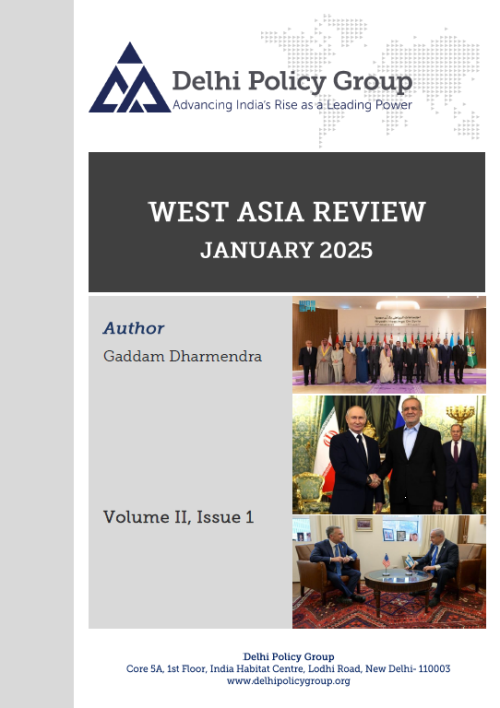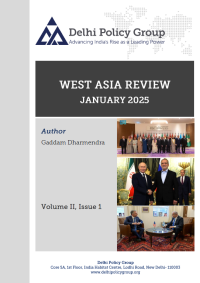West Asia Review
Date: February 06, 2025
A tenuous six-week ceasefire came into effect in Gaza on January 19, 2025, a day before President Trump’s inauguration for a second term. The Gaza ceasefire brings a fragile suspension to the 15-month long conflict between Israel and Hamas. Meanwhile, a controversial call by President Trump to relocate Gazans to Egypt and Jordan received a firm pushback from the Arab states.
Saudi Arabia hosted ‘Riyadh Meetings on Syria’ on January 12, 2025. In addition to the Syrian Foreign Minister, Foreign Ministers in attendance included those from the UAE, Kuwait, Egypt, Jordan, Iraq, Lebanon, and Turkey. Also invited were senior officials from France, the UK, Germany, Italy, Spain, the US, and the European Union. Apart from signalling readiness to fund the reconstruction of Syria, Saudi Arabia is seeking to reshape the regional order by diminishing and rolling back Iranian influence, and preventing the rise of destabilising Islamist regimes seen as inimical to regional stability. Analysts are pointing to a Saudi-led ‘Axis of Stability’ anchored in development and modernisation, as opposed to Iran’s regressive ‘Axis of Resistance’.
Russia and Iran concluded a long-pending 20-year strategic partnership agreement in Moscow on January 17, 2025. The deal was signed just days ahead of President Trump’s swearing-in ceremony, and visiting Iranian President Masoud Pezeshkian was quoted as saying that Iran-Russia cooperation “can neutralize US and Western sanctions and their excessive demands”.
A two-year deadlock in Lebanese politics was broken with the election of General Joseph Khalil Aoun, Commander of the Lebanese Armed Forces, as the country’s 14th President on January 9, 2025. Aoun’s election for a six-year term was backed by the US and Saudi Arabia, and represents a fundamental shift away from the years long dominance of Lebanese politics by Hezbollah.
To read this West Asia Review, Vol. II, Issue 1, please see the PDF attached.
Saudi Arabia hosted ‘Riyadh Meetings on Syria’ on January 12, 2025. In addition to the Syrian Foreign Minister, Foreign Ministers in attendance included those from the UAE, Kuwait, Egypt, Jordan, Iraq, Lebanon, and Turkey. Also invited were senior officials from France, the UK, Germany, Italy, Spain, the US, and the European Union. Apart from signalling readiness to fund the reconstruction of Syria, Saudi Arabia is seeking to reshape the regional order by diminishing and rolling back Iranian influence, and preventing the rise of destabilising Islamist regimes seen as inimical to regional stability. Analysts are pointing to a Saudi-led ‘Axis of Stability’ anchored in development and modernisation, as opposed to Iran’s regressive ‘Axis of Resistance’.
Russia and Iran concluded a long-pending 20-year strategic partnership agreement in Moscow on January 17, 2025. The deal was signed just days ahead of President Trump’s swearing-in ceremony, and visiting Iranian President Masoud Pezeshkian was quoted as saying that Iran-Russia cooperation “can neutralize US and Western sanctions and their excessive demands”.
A two-year deadlock in Lebanese politics was broken with the election of General Joseph Khalil Aoun, Commander of the Lebanese Armed Forces, as the country’s 14th President on January 9, 2025. Aoun’s election for a six-year term was backed by the US and Saudi Arabia, and represents a fundamental shift away from the years long dominance of Lebanese politics by Hezbollah.
To read this West Asia Review, Vol. II, Issue 1, please see the PDF attached.



